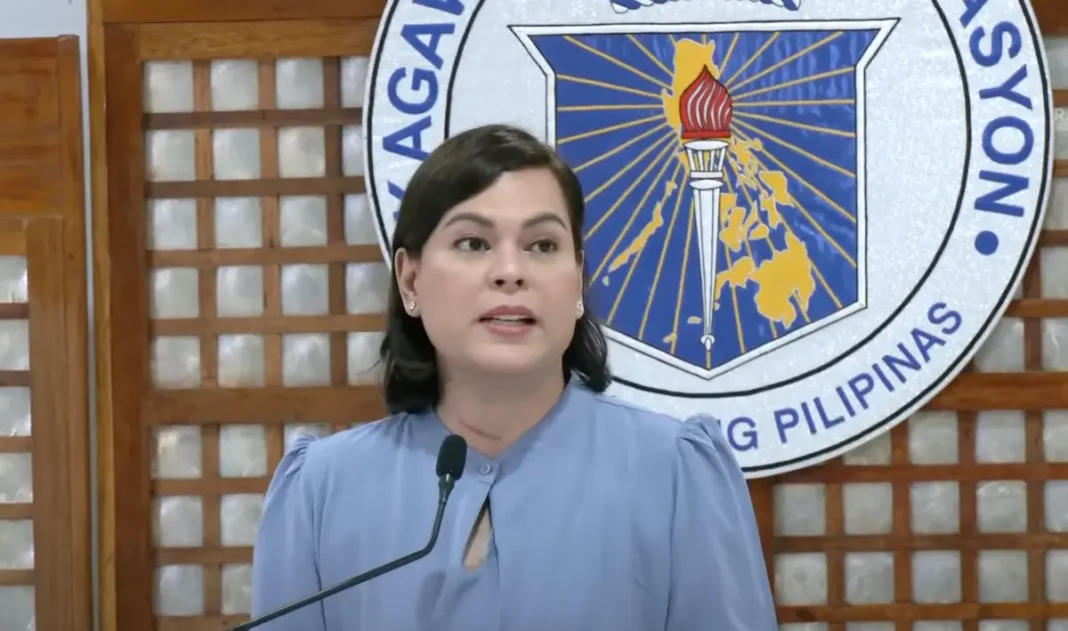Sara Duterte, the Vice President of the Philippines, has long been a commanding presence in the country’s political landscape, known for her strong-willed nature and decisive leadership style. However, recent controversies have brought her under intense scrutiny, particularly surrounding the contentious use of a confidential fund allocated to the Office of the Vice President (OVP). The controversy centers on an astounding expenditure of PHP 125 million in just 11 days, sparking debates over transparency and accountability. Coupled with her combative approach in budget hearings, her controversial support for Pastor Apollo Quiboloy, the children’s book “Isang Kaibigan,” and the sudden breakup of the UniTeam alliance with President Ferdinand “Bongbong” Marcos Jr., Sara Duterte’s political journey has become even more polarizing, raising questions about her leadership style and future ambitions.
The Confidential Fund: A Controversial 11-Day Spending Spree
The most explosive controversy to date involves the confidential fund allocated to the OVP—a staggering PHP 500 million. While the size of the fund alone raised eyebrows, the real scandal emerged when it was revealed that PHP 125 million was spent in just 11 days. The swift and substantial expenditure immediately drew criticism from lawmakers, watchdog groups, and the public, who demanded answers about how and why such a large sum was used in such a short time.
Sara Duterte defended the allocation, claiming it was necessary for unspecified “security and intelligence” purposes. However, her refusal to provide details about the fund’s utilization, citing national security concerns, has only fueled suspicion. Critics argue that the OVP does not traditionally handle national security matters and that the lack of transparency around the spending suggests a potential misuse of public funds. The controversy intensified during a House briefing, where Duterte faced intense questioning from lawmakers demanding clarity and accountability regarding the expenditure.
House Briefing: A Clash of Wills and Accusations of Bullying
The latest House briefing on the OVP’s budget was marked by heated exchanges and what some lawmakers described as “bullying tactics” from Sara Duterte. During the session, Duterte was criticized for her combative approach, refusing to directly answer questions about the confidential fund and often deflecting queries by questioning the motives of the lawmakers themselves. Her stance drew the ire of several congressmen, who accused her of attempting to intimidate her critics rather than provide the transparency they sought.
At one point, Duterte reportedly chastised the lawmakers for their line of questioning, suggesting they were politicizing the issue and undermining her office’s work. This provoked a strong response from opposition lawmakers, who argued that the Vice President’s refusal to cooperate was a blatant disregard for the principles of accountability and good governance. Some congressmen called for a deeper investigation into the confidential fund, and there have been calls for a full audit to determine how the funds were spent.
The heated confrontation highlighted a growing rift between Duterte and some members of Congress, many of whom believe that her evasive tactics only reinforce suspicions of wrongdoing. For her supporters, however, her defiance is seen as a strength—a sign of her unwillingness to be cowed by political opponents.
The Breakup of the UniTeam Alliance: Resignation and Realignment
Another significant development in Sara Duterte’s political career is the apparent breakdown of her alliance with President Ferdinand “Bongbong” Marcos Jr., known as the UniTeam. The alliance, which brought together two powerful political dynasties during the 2022 elections, was seen as a formidable coalition aimed at securing political dominance. However, tensions between Duterte and Marcos have become increasingly apparent in recent months, culminating in a dramatic breakup that led to Duterte’s resignation as Secretary of the Department of Education (DepEd) and her departure from the National Task Force to End Local Communist Armed Conflict (NTF-ELCAC).
The first signs of a rift emerged when Duterte began to distance herself from certain policies and positions taken by the Marcos administration. Insiders suggest that disagreements over key issues, including the allocation of resources, the use of confidential funds, and strategic policy directions, contributed to growing tensions between the two leaders. The final straw came when Duterte publicly criticized what she perceived as a lack of support and understanding from the administration, leading her to resign from her cabinet post as Education Secretary in June 2024.
Duterte’s resignation from the DepEd and her departure from the NTF-ELCAC—a controversial government task force aimed at ending communist insurgency in the Philippines—was a clear signal of her discontent. Her resignation statements hinted at deeper issues, mentioning “differences in governance” and a need to realign her priorities with her own political goals. Her move was seen by some as an effort to distance herself from the Marcos administration and its growing criticisms, while others speculated that it was a strategic maneuver to position herself for future political endeavors, potentially including a run for higher office.
Support for Controversial Figures: Aligning with Pastor Quiboloy
Adding to her challenges, Sara Duterte has also faced criticism for her continued support of Pastor Apollo Quiboloy, a fugitive wanted by U.S. authorities for alleged sex trafficking of minors, conspiracy, and fraud. Quiboloy, who has been a vocal supporter of the Duterte family for years, remains a controversial figure in the Philippines. Duterte’s open support of Quiboloy, whom she describes as a mentor and friend, has raised ethical questions about her associations and judgment.
Critics argue that her unwavering defense of Quiboloy, despite the severe charges against him, reflects poorly on her commitment to justice and human rights. Her position has been described as a dangerous alignment with a figure accused of serious crimes, potentially undermining her credibility as a leader committed to law and order.
The “Isang Kaibigan” Book Controversy: Accusations of Propaganda
In the midst of these controversies, Sara Duterte’s release of a children’s book titled “Isang Kaibigan” has also sparked debate. Marketed as a story that teaches values such as kindness, honesty, and respect, the book has been viewed by critics as a subtle form of political messaging aimed at cultivating a positive image among younger generations.
Some education experts and lawmakers have questioned whether it is appropriate for a sitting Vice President to author a book that appears to serve political purposes, particularly when public funds and resources may have been involved. The debate around “Isang Kaibigan” has added another layer to the growing perception that Duterte is more focused on personal branding than on transparent governance.
Navigating a Political Minefield: What Lies Ahead for Sara Duterte?
Sara Duterte’s current controversies have cast a long shadow over her tenure as Vice President, presenting a critical test of her leadership. With mounting questions about the PHP 125 million confidential fund, her contentious behavior in budget hearings, her association with Pastor Quiboloy, and the dramatic breakup of her political alliance with President Marcos, Duterte’s approach has drawn both criticism and support, revealing the stark divisions in Philippine society over her leadership style.
Supporters argue that her defiance in the face of opposition is a sign of her strength and resolve. To them, Sara Duterte is a leader unafraid to confront her detractors and stand by her decisions, even when they are unpopular. However, for her critics, her actions signify a troubling lack of accountability and an unwillingness to engage transparently with the legislative process.
As she continues to navigate these controversies, Sara Duterte’s political future remains uncertain. Will she be able to quell the growing discontent and reaffirm her position as a strong leader? Or will these controversies ultimately erode her political capital and hinder her ambitions for higher office? Whatever the outcome, Sara Duterte remains a pivotal figure in the Philippines’ political landscape, where her every move is closely watched and intensely debated.



